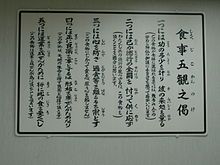Draft:Gokan No Ge - Verse of the Five Contemplations
Submission declined on 5 November 2024 by Theroadislong (talk).
Where to get help
How to improve a draft
You can also browse Wikipedia:Featured articles and Wikipedia:Good articles to find examples of Wikipedia's best writing on topics similar to your proposed article. Improving your odds of a speedy review To improve your odds of a faster review, tag your draft with relevant WikiProject tags using the button below. This will let reviewers know a new draft has been submitted in their area of interest. For instance, if you wrote about a female astronomer, you would want to add the Biography, Astronomy, and Women scientists tags. Editor resources
|  |

Gokan No Ge is a chant that is recited before meals, mainly in Zen Buddhism.This is a translation by Huang Tingjian in the Song dynasty (960-1279) for the benefit of monks and laymen of the Nanshan Risshu of the Tang dynasty (918-907). It became widely known in Japan through a quotation in Dogen's work, "Fushuku Hanpo" (The Way of Porridge and Rice)..It is one of the dietary practices of monks, but because it is a text of high moral universality, it is cited not only in Zen but in many other fields. It is also called "Gokanmon" or "Shokuji Gokanmon" or "Shokujikun".
Chant
[edit]- Hitotsu ni wa, kō no tashō wo hakari, kano raisho wo hakaru
- Futatsu ni wa, onore ga tokugyō no zenketsu wo hakatte, ku ni ōzu
- Mitsu ni wa, shin wo fusegi, toga wo hanaruru koto wa tontō wo shū to su
- Yotsu ni wa, masa ni ryōyaku wo koto to suru wa gyōko wo ryōzen ga tame nari
- Itsutsu ni wa, jōdō no tame no yue ni, ima kono jiki wo uku
Translation
- First, we consider how this meal came to be and appreciate the work of the many people who worked until it was served.
- Second, we reflect on whether our own behavior is worthy of this food.
- Third, in order to keep our minds clean and avoid doing wrong, we pledge not to commit the three mistakes of Ton (greed), etc.
- Fourth, food is good medicine, and we eat it to nourish our bodies and achieve proper health.
- Fifth, we receive this meal now in order to accomplish our own enlightenment.
Interpretation
[edit]There are some differences in the reading of the chants among the different schools of Buddhism. In the Rinzai and Obaku schools, the third verse reads, "Mitsu ni wa, shin wo fusegi, toga tontō wo hanaruru wo shū to su (Third, to keep our minds clean, we pledge to let go of excesses and greed, etc.)". The term "tontō (greed, etc.)" refers to the so-called "three poisons" of Ton (greed), Jin (hatred), and Chi (delusion), which are the three kinds of afflictions.These are "greed," "anger and hatred," and "ignorance and stupidity," respectively. In the area of food, they warn against greed, which leads to excessive eating and binge eating, against narrow-mindedness, which leads to aversion and dissatisfaction with food, and against stupidity, which does not respect the significance of food and its manners.
There are many interpretations of the Gokan No Ge, but the official Sōtō School sources include the commentary in "Sōtō Shū Seinen Seiten", published by the Sotoshu Shumucho, and the mid-Edo period book "Jushoku Gokan Kummō", by Menzan Zuihō, which explains in plain words how the Gokan No Ge was established and the intent of the chants.
Another version of the Gokan No Ge is found in the Shōji 2 (1200 A.D.) "Shukke Taikō" written by Eisai, who was Dogen's mentor.
- Hitotsu ni wa, mono no kō no tashō kanzeyo (First, consider how valuable it is.)
- Futatsu ni wa, onore no toku no kōhaku wo kanzeyo (Second, consider your own virtues.)
- Mitsu ni wa, ryōyaku naru koto wo kanzeyo (Third, consider it is good medicine.)
- Yotsu ni wa, seshu wa sore zenchishiki nari to kanzeyo (Fourth, consider the donor is a good mentor.)
- Itsutsu ni wa, dō wo enga tame naru koto wo kanzeyo (Fifth, consider it is to accomplish our own enlightenment.)
Reference
[edit]- Menzan Zuihō, "Jushoku Gokan Kummō," Volume 1, Kyōho 20 (1735). Included in "Sōtō Zensho", Annotations Vol. 4.
- Dogen, "Tenza Kyōkun, Fushoku Hampo," Kodansha Gakujutsu Bunko, July 1991. ISBN 4-06-158980-6

- in-depth (not just passing mentions about the subject)
- reliable
- secondary
- independent of the subject
Make sure you add references that meet these criteria before resubmitting. Learn about mistakes to avoid when addressing this issue. If no additional references exist, the subject is not suitable for Wikipedia.